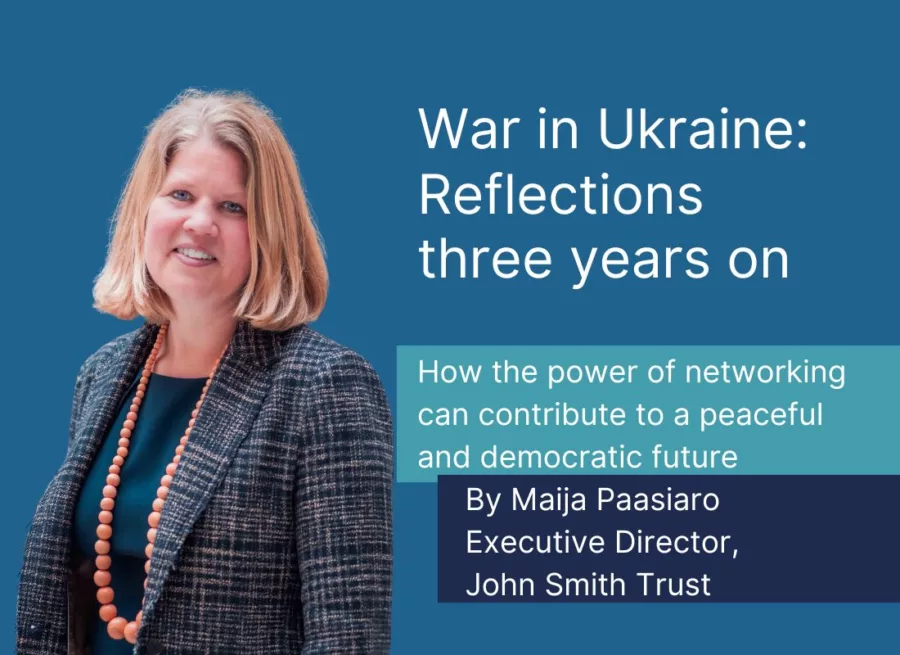How the power of networking can contribute to a peaceful and democratic future

When Russia launched its full-scale invasion of Ukraine our immediate priority was to support Ukrainian John Smith Fellows in our network. This included amplifying their humanitarian work, showing solidarity and sharing reliable information from the ground. Our current and former staff and trustees also leveraged their UK networks to mobilise aid, in-kind donations and helped Fellows and their families to find refuge in the UK.
In the longer term, we have had to rethink how we work. The Trust was established in the 1990s to help emerging leaders in the former Soviet Union navigate an anticipated democratic transition. Thirty years on, the context is very different. Democracy is facing a crisis of trust. Authoritarianism and populism are on the rise. Our world is increasingly fragmented and polarised. We are all facing similar challenges and will be better equipped to tackle them if we work together, listening and learning from each other.
Being a small, independent organisation has allowed us to be agile and responsive. Our strength lies in our networks, built through 30 years of running fellowship programmes for exceptional young leaders from Eastern Europe, Russia, the South Caucasus and Central Asia. Staying connected with them gives us the insights we need to develop responsive programmes.
Driving change in Ukraine
As our Ukrainian Fellows’ focus has evolved over the last three years from immediate humanitarian response to long-term transformation, institutional reforms and sustainable development, so too has our programming as we now focus on supporting the capable leaders within Ukraine who are looking for international partners to help drive change.
At the same time, we recognise that Ukrainians have a wealth of expertise – from cyber threats to digital transformation and crisis management to civic activism – that can offer valuable learning for counterparts in the UK and elsewhere.
Through our Ukrainian Women’s Leadership Programme, in partnership with the University of Edinburgh Business School, and through our current Scotland-Ukraine Reconstruction and Recovery Leadership Programme, our focus is on fostering collaborative connections between counterparts in both countries. By developing and sharing expertise together, we can help ensure Ukraine’s reconstruction and recovery is sustainable, fair and inclusive.
Working with exiled leaders
As we’ve heard time and time again from our network, “Ukraine’s fight has become everyone’s fight” – and that includes the Russian and Belarusian professionals who have been part of our recent leaders in exile programmes. Unlike other organisations who have opted to exclude all Russians and Belarusians, as aggressor-state passport holders, from their programmes, we have taken a more nuanced approach: we have developed a separate strand of programming for those exiled leaders who are actively working towards an alternative, peaceful and free future for their countries.
We think it is more important than ever to engage with Russians and Belarusians who oppose the war and are committed to a peaceful and democratic future for their countries. Not doing so increases Putin and Lukashenka’s power to silence people opposed to their regimes. These programmes support Fellows to develop the insights and skills needed to build the kinds of societies they want to live in in the future. This includes working on shifts needed to break away from authoritarian, imperialistic and patriarchal mindsets.
After everything that Ukrainians have gone through these last three years – and indeed the past 11 years since the illegal annexation of Crimea in 2014 – they deserve nothing less than a just peace. In the long term, such a peace will only be sustainable if there are leaders on all sides who are willing to listen and learn from each other, who have the skills to debate and disagree with each other respectfully, who can hold difficult conversations about the past and who are motivated and inspired to imagine alternative ways of doing things. The Trust has a history of facilitating discussions and fostering collaborations with people who sometimes have very different backgrounds and points of view. Through our programmes we are creating connections and hope for a brighter future.
Read more about our Fellows’ work in Ukraine
This story was commissioned in collaboration with The Foreign Policy Centre as part of their series War in Ukraine: Reflections three years on
